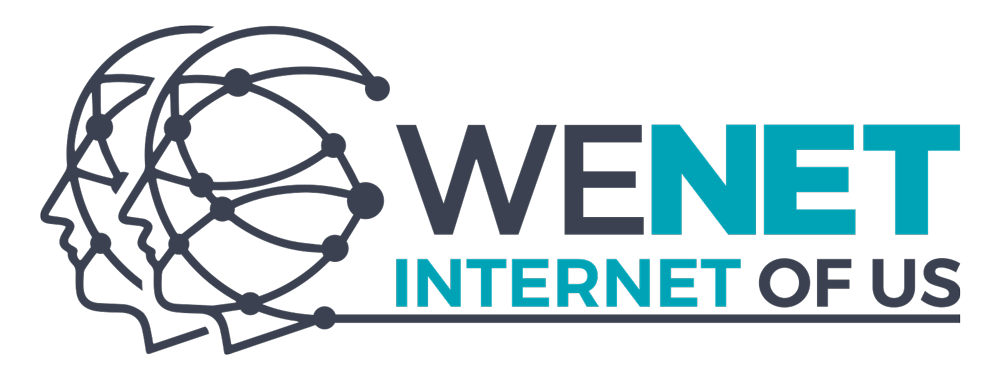ABOUT THE OPEN CALL
WeNet – The internet of Us – is a project funded by the European Commission under the European Union’s Horizon 2020 Research and Innovation Programme and the call topic FETPROACT-01-2018: FET Proactive: emerging paradigms and communities. WeNet was launched in January 2019 to empower machine-mediated diversity-aware social interactions. The project offers support to external institutions to contribute to increase the diversity in terms of communities of users and data collected through the cascade funding mechanism, with a total budget of 250.000€.
The support provided is relying on a cascade funding scheme involving Horizon 2020 funds. The scheme is based on a Grant Agreement signed by the European Commission and the WeNet Consortium partners. The Consortium partners as such receive the Horizon 2020 funds which are then transferred to the winners of the WeNet open call after signing a Sub-Grant Agreement. This means that funds that will be received by the call winners are Horizon 2020 funds.
Cascade Funding, also known as Financial Support to Third Parties (FSTP), is a mechanism of the European Commission to distribute public funds in order to create new companies, increase their scalability, SMEs and/or mid-cap companies, in the adoption or development of digital innovation. The main objective of this financing method is to simplify administrative procedures with SMEs, thus allowing some projects financed by the EU to issue, in turn, open calls to obtain more funding.
THE WENET PLATFORM
Yes, documentation can be found in D6.3 (https://www.internetofus.eu/wp-content/uploads/sites/38/2021/07/D6.3-WeNet-platform-v.2.0.pdf). Further material (including tutorials) can be found also on the WeNet E-Learning Platform.
Beside D6.3 and the WeNet E-Learning Platform , we can suggest accessing the dedicated Swagger here.
The pilots conducted within the project involved 200+ users and survey activities over 2000 users. Selected participants are also expected to provide new users to the community.
ELIGIBILITY CRITERIA
The WeNet Open Call is aimed at:
- Startups;
- Small and medium-sized enterprises;
- Large enterprises;
- Universities;
- Research centers;
- NGOs;
- Foundations and other non-profit entities.
Only Applicants legally established in any of the following countries are eligible:
- Member States of the European Union, including their overseas departments and outermost regions;
- Associated Countries according to the updated list published by the EC;
- Third Countries according to the updated list published by the EC;
- United Kingdom under the conditions set by the EC for H2020 participation at the time of the deadline of the call.
The eligible costs are:
- Personnel Costs
- Other Direct Costs
- Indirect Costs (will be covered if they are declared as flat-rate of 25% of the eligible costs)
Only proposals written in English will be accepted.
In principle yes: the application has to be submitted by one entity and an agreement has to be done between the parties.
HOW TO PARTICIPATE
Submission to the Open Call closed on 30 SEPTEMBER 2021 (12:00 CEST).
Dates for the different phases of the programme are outlined below but may be subject to change if any modifications in the project’s schedule occur.

The starting date of the project is expected to be in February 2022.
Submission to the Open Call is now closed.
Applications must be submitted electronically – Submission to the Open Call is now closed.
Proposals submitted by any other means and after the call closure will not be evaluated.
Proposers must complete the application form available on the website (submissions are now closed), as well as the requested documents indicated in the application.
Before applying, read the Guide for Applicants available on this website.
Only one proposal will be accepted per legal entity.
In the case of a multiple submission, only the last one received (timestamp of the system) will enter into our evaluation process, the rest being declared as non-eligible and thereby discarded.
If the last submitted proposal is declared then non-eligible or fails to reach the thresholds of the evaluation, the other proposals submitted earlier will not be considered for evaluation.
Yes, use of the official proposal template is a mandatory requirement.
EVALUATION PROCESS
The evaluation criteria are the following:
(1) Clarity and methodology
(2) Feasibility & Implementation
(3) Qualifications of the applicant
(4) Complementarity with the existing WeNet pilots/activities
(5) Alignment with the ethical and data protection standards of WeNet
(6) Overall value for money
Each proposal will be evaluated by at least two different experts, scoring each of the mentioned criteria.
The evaluators are independent experts with various expertise relevant for the scope and objectives of the WeNet project. They are required to be independent, impartial and objective, and to behave throughout the evaluation process in a professional manner. They sign an expert contract, including a declaration of confidentiality and absence of conflict of interest, before beginning their work.
Yes, references can be added to the proposals but keep in mind evaluators would not be bound to check them.
ADMINISTRATIVE & LEGAL
The Open Call applicant will need to submit an invoice within 15 days from the approval of the technical and financial reports for the whole budget allocated. The payment will be executed within 30 days after the invoice reception.
Open Call applicants will be requested to submit a Final Report consisting of:
- Abstract of the project developed
- Detailed description:
- Results and achievements
- Project execution
- Ethics and data protection
- Feedback to WeNet
- Dissemination material
Open Call applicants will be required to use this specific template for the Final report.
All rights concerning the work of the participant to the Open Call generated during the project will remain with the participant.
Every exploitation activity of the newly created app will be allowed, as applicants retain IPR, as long as completely independent from the WeNet platform.
As indicated by the EC Guidelines, Third Parties do not have any IPR rights on the foreground of the project.
The platform acts as controller and partner U-Hopper acts as processor – data is then shared on Research Infrastructure (only anonymous data can be uploaded, and how to collect data as anonymous is up to the selected participants).
STILL NEED MORE HELP?
Feel free to contact us at [email protected]. We welcome your questions and feedback!


